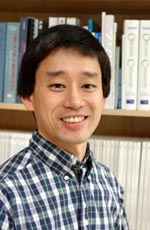 Gregory C. Fu received an SB degree from MIT in 1985, where he worked in the laboratory of Prof. Barry Sharpless. After earning a PhD from Harvard in 1991 under the guidance of Prof. David Evans, he spent two years as a postdoctoral fellow with Prof. Robert Grubbs at Caltech. In 1993, he returned to MIT, where he is currently Professor of Chemistry. Professor Fu has established a vibrant research program covering a range of topics at the forefront of synthetic methods development. Among the earliest and most original projects is his imaginative use of planar-chiral heterocycles based on the ferrocene scaffold. These unique structures have provided remarkable selectivities as nucleophilic catalysts in a number of reactions including kinetic asymmetric transformations of secondary alcohols, desymmetrization of meso epoxides and Staudinger reactions. These compounds have also found applications as chiral ligands for transition metals in new, beta lactam forming reactions.
Gregory C. Fu received an SB degree from MIT in 1985, where he worked in the laboratory of Prof. Barry Sharpless. After earning a PhD from Harvard in 1991 under the guidance of Prof. David Evans, he spent two years as a postdoctoral fellow with Prof. Robert Grubbs at Caltech. In 1993, he returned to MIT, where he is currently Professor of Chemistry. Professor Fu has established a vibrant research program covering a range of topics at the forefront of synthetic methods development. Among the earliest and most original projects is his imaginative use of planar-chiral heterocycles based on the ferrocene scaffold. These unique structures have provided remarkable selectivities as nucleophilic catalysts in a number of reactions including kinetic asymmetric transformations of secondary alcohols, desymmetrization of meso epoxides and Staudinger reactions. These compounds have also found applications as chiral ligands for transition metals in new, beta lactam forming reactions.
Professor Fu is best known for his pioneering work on the design of modified phosphine ligands for a wide variety of palladium catalyzed reactions. His development of sterically demanding, alkyl phosphines has dramatically expanded the scope of cross-coupling reactions by allowing the use of aryl chlorides as electrophiles at room temperature. His recent demonstration of the coupling of alkyl electrophiles has fundamentally changed the current thinking about the generality and limitations of palladium catalyzed processes.
Professor Fu's outstanding accomplishments in such a short period of time have been duly recognized by many prestigious honors and awards. Among the most notable are an NSF Young Investigator Award (1994), an A. P. Sloan Foundation Fellowship (1997), a Camille Dreyfus Teacher Scholar Award (1997), an A. C. Cope Scholar Award from the ACS (1998), the Springer Award in Organometallic Chemistry (2001), and most recently, Prof. Fu has been honored as the first E. J. Corey Awardee (2004). In addition to these honors, Prof. Fu has received many awards from the industrial sector as well as for his outstanding dedication to teaching from the undergraduates at M.I.T.